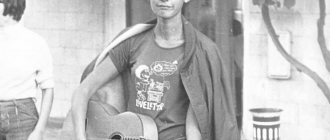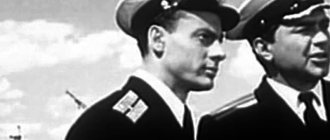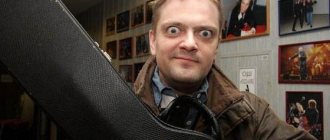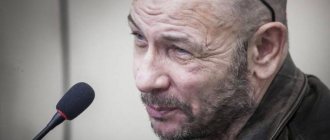The will of Leonid Bykov
In April 1976 (three years before his death), Leonid Fedorovich had a heart attack. Just at this time, the filming of the famous film “Aty-Bati, the soldiers were marching…” was taking place. Leonid Bykov was admitted to the hospital, where he wrote a letter of testament addressed to his friends Nikolai Mashchenko and Ivan Mikolaichuk:
Dear Ivan! Dear Nikola!
I am turning to you with a difficult and not very grateful request.
1. Never believe anyone that “I committed suicide.” Just if that happens, know that I'm worn out.
2. The most important thing. My pain, my conscience, my guilt - Les (Bykov’s 19-year-old son). Help him believe in people. So much fell upon him that this grief would have been enough for an entire nation. He suffered so much grief. It is my fault that I discouraged him from “my bread.”
3. And now for more “secondary humorous” sketch requests.
You know that “the movie lines haven’t saved up a ruble,” so let someone “smart” help sell the car, since the children won’t receive a pension for their father (I found out), and Tom (my wife), unfortunately, is disabled: work she won't be able to. Yes, she won’t stay long without me, she will catch up, since we lived a beautiful life with her, although I often upset her with my boring character...
4. And now about something really funny. Funerals are a hassle...
1) Take it out of the house as quickly as possible so as not to torment mine.
2) Get Lesik to be allowed to come that day (if, of course, the doctors allow it, so that it doesn’t break him completely).
3) No orchestras.
4) No studios, House of Cinema (union) - God forbid. From home - straight to where you're supposed to go. This is my cry, my plea. Without the circus called honors.
5) No funeral speeches, otherwise I will get up and leave: it will be an embarrassment.
Only one of you, whoever wants to, will say one word: “Farewell.”
This is to somehow put an end to it, otherwise they won’t “understand” us.
After this, smack everyone as much as you can, but - I beg you - not at home. This, of course, is blasphemy and a violation of folk tradition, but I really ask, not for me, since I won’t care about all this, but for Toma and the children.
6) Let the guys sing “Cranes”, “Earring with Malaya Bronnaya...”, “Take an Overcoat” and “This Victory Day”. That's all. They won't refuse.
And then let the 2nd squadron “hit” the “Darkie” from start to finish...
I really regret that I didn’t manage to do anything worthwhile. Have you noticed that I am a director not by diploma, but by vocation? Even directing my own funeral?! It gives!
Thanks and bye!
A few days later, Emilia Kosnichuk came to visit Bykov. She took this letter, promising to give it to Bykov’s friends, but she got busy and forgot. She remembered the letter only three years later - in April 1979...
Later activities
The painting “Aty-Bati, the soldiers were marching” became truly iconic for Bykov. And not only because her appearance on the screens created an incredible sensation, but also because it cost him very dearly - his own health. The complex plot of the film required enormous efforts for film adaptation. A suitable location, props, and also military equipment were needed. And soldiers, of course, were needed in large numbers. All this was kindly provided to Mr. Bykov by the Soviet army - they relied on him, they hoped for him. The responsibility placed on Bykov's shoulders was incredible. However, as often happens, at these most crucial moments everything does not go according to plan - this is what happened this time too.
Not only did filming begin much later than planned, but during the first development of the film it turned out that the footage was defective - most of the film needed to be re-shot. All the established deadlines were missed, and Bykov was reprimanded not by anyone, but by the Minister of Defense himself, Marshal Grechko, who returned after a meeting with whom Bykov had a heart attack. It took a whole month to recover, and immediately after leaving the hospital, Bykov, without hesitation, went to the set where his film was being filmed, in which he was also one of the main actors. He completed it and it was a new triumph.
However, Leonid Fedorovich’s health soon deteriorated again, and the cause of this was again a heart attack. This time after he learned that Oles, his adored child and only son, turned out to be a member of a dubious company that robbed one of the local jewelry stores. At the same time, the actor was awarded the Ukrainian Prize for the film “Aty-Bati, Soldiers Came”, however, in light of recent events, he firmly decided to refuse it. The award nevertheless found its owner - the Central Committee of the Communist Party of Ukraine ordered it to be brought to Bykov directly to his home.
Death of Bykov. Date and place of incident.
Leonid Fedorovich Bykov died on April 11, 1979, on the forty-sixth kilometer of the Minsk-Kyiv highway (not far from the urban village of Dymer, Vyshgorod district, Kyiv region).
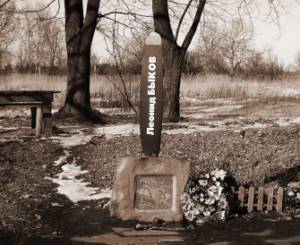
Place of death of Bykov
A memorial sign at the place of death of Leonid Bykov in the form of an airplane propeller blade. It was installed 15 years after the tragedy. According to eyewitnesses, the memorial is not exactly located. The real site of the tragedy is located ~400 meters away.
By the way, this is already the second version of this monument. At first, another one stood at the place of death - in the form of an airplane wing with a memorial plaque attached. However, for some reason Bykov’s daughter did not like the monument, and she hired people to remove it. The people's love was so great that people, not seeing the usual monument, thought that it was the work of vandals and independently installed this one, in the form of a propeller blade.
But this new memorial was also changing. In particular, in 2013, the propeller blade itself disappeared. Now the Memorial is back in proper form.
Death of Bykov. Funeral
On April 13, 1979, the funeral of Leonid Bykov took place in Kyiv. He was buried carefully observing the will of the deceased: without funeral speeches, an orchestra and the display of the coffin in the Union of Cinematographers.
The song “Darkie” was performed right at the cemetery. We limited ourselves to this. This is how Nikolai Mashchenko remembers this day:
There were no speeches, no music. Although several orchestras came to the cemetery, we refused them and carried the coffin in complete silence. I used to think that mourning music enhances sadness! It turned out that it was the other way around! It is much more difficult to withstand dead silence! And now comes the climax, all that remains is to fulfill Leni’s last wish. And until recently I doubted: is it possible to sing in a cemetery? And also about the green maple? Then I look at Talashko, Podgorny, Fedorinsky and understand that they can no longer stand it. And then I said the only word of this funeral, “Farewell!” – and the guys sang “Darkie”...
Burial place of Leonid Bykov
Leonid Fedorovich Bykov is buried at the Baikovo cemetery in Kyiv.
The actor is buried in plot No. 33, bordering plot No. 49. Previously, a monument was erected at the grave.
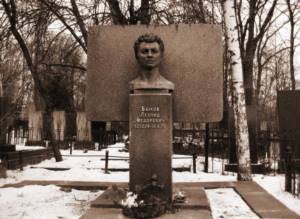
Monument at the grave of Leonid Bykov
At the moment there is no bust on the grave, it looks like this. His wife Tamara Kravchenko, who died in 2010, is buried next to the actor.
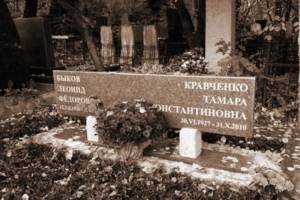
The grave of Leonid Bykov today
The bust was dismantled on the instructions of Leonid Bykov’s daughter, who ordered the production of a new monument.
Personal life
Leonid Bykov was not only a talented actor and director, but also a man of rare spiritual qualities. Very decent, kind, somewhat naive, he never made a deal with his conscience, even if it threatened him with serious trouble. Unlike most of his colleagues, Leonid loved only one woman - his wife Tamara Kravchenko (although he had plenty of fans). They met while still students at the Theater Institute and never parted. The marriage produced two children - son Les (Alexander) and daughter Maryana. Tamara soon abandoned her acting career, deciding to just be a wife and mother.
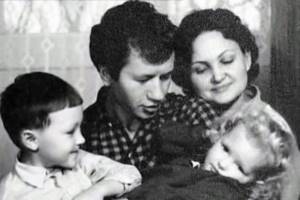
Leonid Bykov with his family. Photo kulturologia.ru
Daughter Maryana remembers the Leningrad period of the family’s life as the happiest. Yes, her father had creative failures, and he suffered his first heart attack after the failure of his “Bunny,” but her parents were young enough then and hoped for a better future.
Upon returning to Ukraine, optimism quickly ended. Bykov found himself out of work. The family with two children were placed in a hostel, although Leonid was promised “mountains of gold” before moving. The actor, who never asked for anything for himself, was forced to seek housing for the sake of his family. There was no office for Leonid at the film studio itself. He set up a workspace for himself in the hallway. There, on a chair sagging from age, under a long-suffering palm tree, on whose soil smokers extinguished their cigarette butts, Bykov worked... for 5 years! Just before the release of “Only Old Men Go to Battle,” the studio management finally ordered to allocate him a tiny room for an office (there are simply no words for indignation!).
The long period of downtime at work and the hostile atmosphere around the actor could not but affect his health, and what happened to his son Les completely undermined Leonid’s strength. Les joined the army, and ended up in the airborne troops - exactly where he wanted. To do this, you had to have excellent health, which was confirmed by several medical commissions.
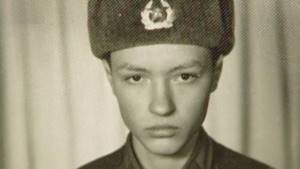
Alexander Bykov. Photo aikaramba.ru
He served safely for a year, and then something happened: Les was declared mentally ill and sent for compulsory treatment to a closed clinic. Bykov did everything to help his son, but the guy’s life was irreparably crippled. With a diagnosis of schizophrenia, it was impossible to triple even the simplest job. Subsequently (according to Maryana), Les will flee to Austria and only there will an independent psychiatric examination recognize his diagnosis as invalid.
Death of Bykov. How it all happened.
So, let's try to reconstruct the events of that tragic day of April 11, 1979.
From April 10 to 11, Leonid Bykov was at his dacha in the village of Strakholesye. O arrived there immediately after a meeting at the film studio. Dovzhenko, where his new film “Alien” was discussed. Bykov was alone at the dacha.
On April 11, Bykov was scheduled for an interview for Soviet Screen. The correspondent was waiting for him at 18:00 in Kyiv. Therefore, on the afternoon of April 11, Leonid Fedorovich got into his Volga and went to the city. At about half past four, on the 47th kilometer of the Misk-Kyiv highway, Bykov catches up with a low-speed tractor. Bykov moves behind the tractor for some time, then attempts to overtake.
Bykov's car accelerates sharply and drives into the oncoming lane. At this moment, a truck carrying glassware is moving in the opposite direction. Leonid Fedorovich noticed the “Lawn” and slammed on the brakes. However, the speed of the oncoming traffic and the speed of Bykov himself were too high and a collision could not be avoided.
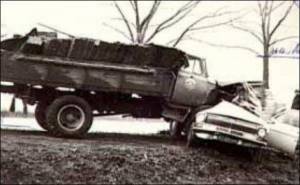
Car accident in which Leonid Bykov died
The speed of the Volga at the time of overtaking was about 100 km/h. Supporters of an alternative version of the artist’s death suggest that the true cause of death could have been a heart attack. They say that this is the only way to explain Leonid Fedorovich’s strangely dangerous maneuver. However, a continuous braking distance of 22 meters to the very point of the collision suggests that Bykov pressed the brake pedal to the last, trying to avoid the impact. For a person suffering a heart attack, this behavior is unlikely.
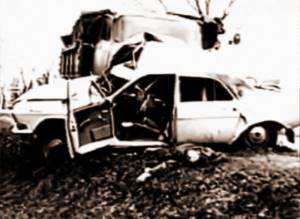
Volga Leonid Bykov after the accident
The truck's bumper hit the front passenger door. The speed of the "Lawn" was also quite high - it dragged the Bykovskaya "Volga" 18 meters. Leonid Fedorovich died on the spot before the ambulance arrived. The examination showed that no alcohol was found in Bykov’s blood. Almost all internal organs were damaged, the ribs were broken along the line of the seat belt.
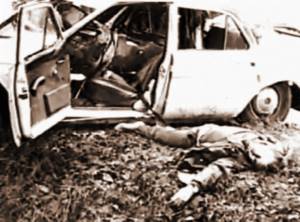
Bykov was pulled out of the car by a truck driver
Bykov was pulled out of the car by a 22-year-old truck driver.
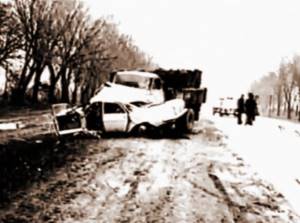
Car accident in which Leonid Bykov died
It is enough to look at the remains of Leonid Fedorovich’s car to understand that he had no chance of surviving this accident.
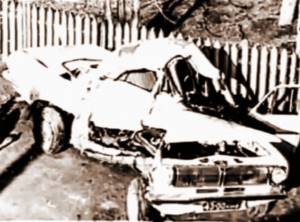
What's left of Bykov's car
There is also another photograph circulating online, supposedly from the scene of the Bykov tragedy. Those who are interested in this topic have probably come across it. Here she is:
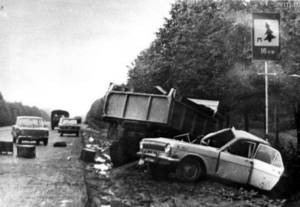
Photos from the place of death of Valery Kharlamov
This photo has nothing to do with Leonid Bykov. In other words, the accident captured in this photograph is a completely different accident. Most likely this is a photo from the scene of the death of Valery Kharlamov. The difference can be seen in the shape of the truck body, the relative position of the cars and the road sign in the frame.
The beginning of a creative career
Leonid did not despair. He remembered that while still at school he was interested in theater, and decided to try himself in this field. He applied to the theater school in Kyiv, but was not accepted. There is a version that Bykov received a refusal due to his short stature, which was only 1 meter 63 centimeters. The guy did not give up his dream of enrolling in a theater school; he was accepted to study at a theater institute in Kharkov. After finishing his studies, Leonid played on the stage of the Kharkov theater for another 9 years. His debut role - the role of a dude in one of the comedies - was immediately remembered by frequent visitors to the theater. This role was bright and quite extraordinary.
In 1960, there was a breakthrough in the career of Leonid Bykov. The Leningrad studio "Lenfilm" invited the actor and director to its team. Bykov agreed without hesitation. It was in this film studio that he became known throughout the Soviet Union. However, after nine years of work in Leningrad, Bykov left for Kyiv. In Dovzhenko's studio he became a leading actor. The actor combined his work in the theater with writing scripts for the magazine “Fitil,” which was famous among film fans for its satirical character. However, the actor’s daughter said that Leonid later considered the move to Kyiv a mistake. In the new studio he was never given his own office. After completing work on the film “Only Old Men Go to Battle,” the actor was finally allocated a small closet, which could hardly be called an office.


